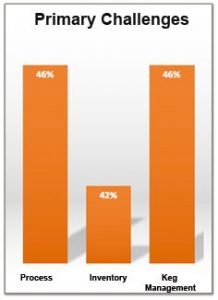[craft brewing industry report excerpt]
Process Challenges

As you might expect with any small business that is growing fast, production and business processes struggle to keep up. Many brewers we spoke with in our data gathering were using the tools, processes and methods that they learned to use years earlier when they were home brewing. These methods and processes are now outdated and cannot deal with volume production and are not easily transferrable to employees. Many brewers are working 7 days a week up to 16 hours a day. Is there any wonder that brewers feel there are not enough hours in the day? There is a notable distinction between being busy and being productive. Being busy does not necessarily mean you are being productive and it tends to be indicative of process challenges, in fact 46% of the breweries we surveyed reported process challenges.
In this report we have placed filing state taxes and dealing with the TTB into Inventory Challenges. Nearly 33% of the breweries we spoke with mentioned it was a “challenge”, to put it kindly. The main issue is that the accuracy required for inventory reporting was impossible to obtain.
If you are looking for solutions to process challenges, it is very hard to provide a one size fits all solution. The answers are almost always in the details of the process in which you have challenges. What further compounds this problem is that many challenges are not directly related to a process that is causing the problem. For example, if you are spending 12 hours a day in your brewery 6 or 7 days a week you might think you need help to offload some of your work. However, without a proper examination of where your time is actually going you might hire someone to help in receiving then find it is the actual brewing that is taking up your time. You love to brew and yet you are burning out because you are always brewing to keep up with demand and you end up neglecting the other areas of your business. If this were the case, getting an assistant brewer might actually be a better solution.
We discovered that the most successful breweries have checklists for everything they do and every process they put in place. They also log their time spent on all activities undertaken. Logging time spent on activities provides you with key information to understand where your brewery is spending its time and when to tweak those activities. It is critical to create time logs, which can be used to develop new methods of control. One tool that we highly recommend is IFTTT (http://www.ifttt.com) which can convert any physical location to an automated time log in a Google calendar. This means at a glance you can keep track of where you have been and for how long. It can also do much much more like automate your social media. There are many great tools that can help with time logging and many can be had for free.
“I’m finding that even though we have a checklist, people are doing things differently. This makes it hard to keep the final product consistent”
“I’m just using Google calendar now to keep track of my brew schedule but it’s not really working.”
“My sales team doesn’t know what they can sell. They’re not always sure if someone else has already sold a keg or not so throughout the week they don’t know what we have and what we don’t have in stock. It also would be great for them to be armed to know when we are planning to brew a beer or when it will be ready should a customer ask them for it while they are in the field.”
“It takes me forever to update media with what we have on tap.”
“I don’t actually know precisely when the beer will be done fermenting. I usually just guess when I plan. This means I can’t always schedule my staff properly.”
“It would be great to know what other local breweries are doing so I can offer something different and we don’t have to compete head to head. Maybe even be more collaborative”
“I work 12 hours a day 6 or 7 days a week. I like what I do but there’s just not enough time”
“I wished I was getting paid (i.e. profitable).”
“We have multiple distributors in multiple states and it is a real challenge to coordinate schedules and inventory and sales reports between the various distributors and the different states.”
“I wish ProMash was still supported”

Recent Comments